- India
- International
From Nehru to JP, the political leaders mentored by Gandhi
Gandhi's friendship with Nehru is known to be the most intriguing and fruitful kinds in the history of nationalsim. Rajaji on this other hand, was fondly referred to by Gandhi himself as "the keeper or my conscience".
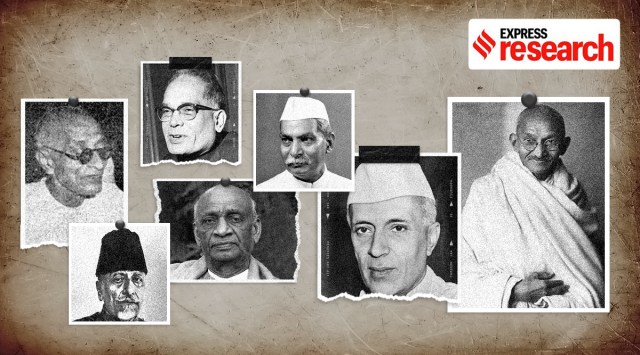 Famously called Gandhi's 'apostles', his closest followers served the nation in varying capacities taking forward his vision. (Wikimedia Commons/ edited by Dinkar Sasi)
Famously called Gandhi's 'apostles', his closest followers served the nation in varying capacities taking forward his vision. (Wikimedia Commons/ edited by Dinkar Sasi)Among the many ways Mahatma Gandhi influenced the birth of independent India was in nurturing and mentoring a close group of followers, who not only served the nationalist movement, but also carried forward Gandhi’s principles long after his death. Famously called Gandhi’s ‘apostles’, they went on to influence the making of India in varying capacities, in the government, the opposition or as influential members of the civil society.
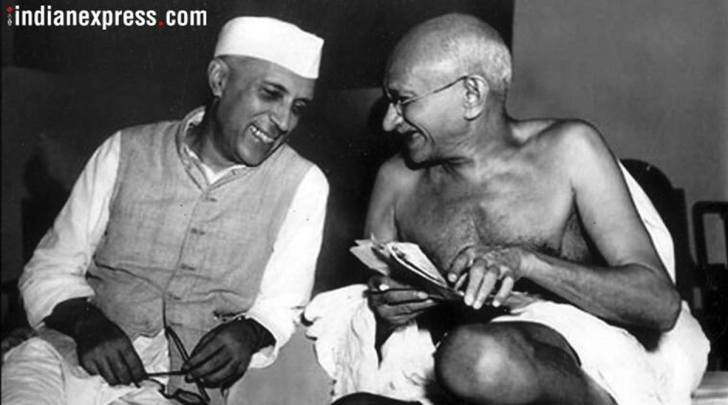 MK Gandhi and Jawaharlal Nehru. (Express Archive Photo)
MK Gandhi and Jawaharlal Nehru. (Express Archive Photo)
Jawaharlal Nehru: Perhaps no other leader was as influenced by the Mahatma as the first prime minister of India, Nehru himself. Yet their relationship was a paradox. Both of them were poles apart in terms of their political and social ideologies, and yet they were intimately connected with each other. Not only were the two separated by 20 years in age, but also by intellectual and temperamental differences. Yet they stood together for more than 25 years. “Their partnership is one of the longest, most intriguing and fruitful in the history of nationalism,” wrote B R Nanda in his book, ‘Jawaharlal Nehru: Rebel and Statesman’. After Gandhi’s death, Nehru carried forward his ideas on pluralism to form the backbone of democracy in India.
Historian Percival Spear in his 1967 biographical essay wrote that despite being passionate and determined, Nehru had a strong need to depend on someone, “even if only to support the unending dialogue on India’s destiny.” At first this role of his mentor was carried out by his father Motilal Nehru, with whom he disagreed quite bitterly. After his father, it was Gandhi to whom he turned. “Nehru differed from his views even more radically than with his father’s but he had unbounded admiration for his idealism and personality,” wrote Spear.
The two had clashed on several occasions, including in the aftermath of the Chauri Chaura incident, in 1931 during the Gandhi-Irwin Pact, in 1934 over the withdrawal of the Civil Disobedience movement and also about the Second World War that broke out in 1939. There were several among Nehru’s colleagues, including Subhas Chandra Bose and J P Narayan, who expected and incited him to revolt against Gandhi’s dominance in the Congress. But it was his reverence towards Gandhi that led him to never carry their differences to a breaking point or encourage his followers to organise an opposition to the latter’s leadership.
Gandhi for his part dispelled any understanding of rivalry between the two when in 1936 he wrote in his weekly newspaper, ‘Harijan’, “Are we rivals?…I can not think of myself as a rival to Jawaharlal or him to me. Or if we are, we are rivals in making love to each other in the pursuit of the common goal.” Six years later, in 1942, Gandhi went on to declare Nehru as his political heir.

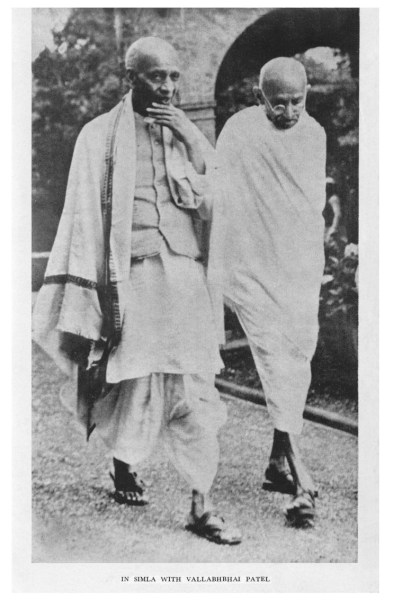 Gandhi and Patel (Source: Collected Works of Mahatma Gandhi, Volume 80, Frontpiece. Published by the Ministry of Information and Broadcasting, Government of India.)
Gandhi and Patel (Source: Collected Works of Mahatma Gandhi, Volume 80, Frontpiece. Published by the Ministry of Information and Broadcasting, Government of India.)Sardar Vallabhbhai Patel: In contemporary politics, Nehru and Patel are often understood as arch rivals. What is often forgotten is the fact that they were in fact co-workers with a common affection and admiration for Gandhi. Patel’s initiation into the nationalist movement in fact was largely the doing of Gandhi. Maulana Abul Kalam Azad in his book, ‘India wins freedom’ (1959) wrote about the beginnings of the Gandhi-Patel friendship.
“Sardar Patel was entirely the creation of Gandhiji….He was one of the many lawyers of Gujarat with hardly any interest or place in the public life of the country. When Gandhiji settled in Ahmedabad, he picked out Patel and step by step built him up….Patel owed everything to Gandhiji.”
“It was Gandhi who needed and wanted Vallabhbhai,” wrote Rajmohan Gandhi in his biography of Patel. “Had Gandhi not asked for help, Vallabhbhai with his strong sense of self-respect, would not have gone about linking his future career with that of a popular hero,” he added.
Patel’s initial reaction to Gandhi was rather scornful. After Gandhi reached Ahmedabad in April 1915 after having spent about 20 years in South Africa, word soon spread about his faith in the ideology of satyagraha that he wanted to experiment with in the fight against the Raj. To this, Patel is known to have laughed and drawn several sarcastic remarks. Despite his ridicule of the Mahatma, his later writings suggest that even in that early stage of their interaction he had begun to respect him.
As for Gandhi, even though his initial impression of Patel was one of a ‘haughty’ man, he confessed soon after, that “the more I came to know him, the more I realised that I must secure his help.” The first issue on which Gandhi secured Patel’s help was forced labour or what was locally known as ‘veth’. Together they undertook several social welfare programmes, including providing relief to the plague affected and in the peasants’ campaign after the famine of 1917. Impressed by Patel’s role in famine relief, Gandhi is known to have pressed him to dine with him every morning and appreciated his refusal to marry though his wife had died 12 years ago.
Gandhi’s actions had touched Patel, but he was still not convinced to give in completely to the cause of the nationalist movement. He would do that on January 9, 1918 when he decided, on the call of Gandhi, to devote all his time to the satyagraha campaign in Kheda. Years later he recollected, “When I joined Gandhiji, I collected some firewood, lit a fire and put all consideration of my family, my career, my reputation and everything into the fire. I do not know what would be left of all these except the ashes” (as cited by Rajmohan Gandhi in his book).
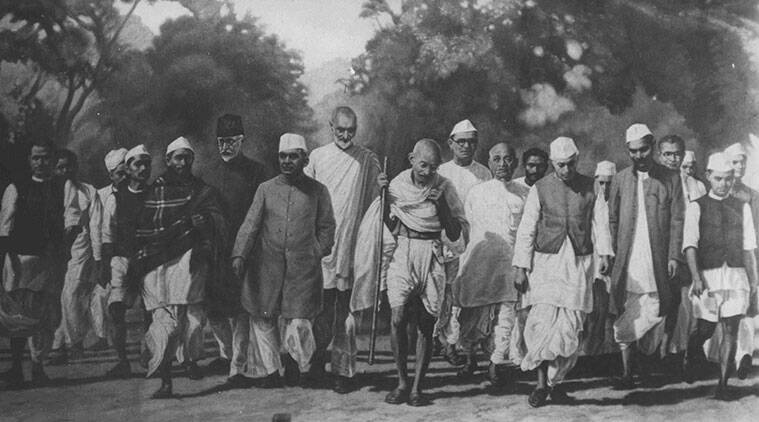 Mahatma Gandhi leading the volunteers of the Indian National Congress during the historic march to Dandi in March, 1930. Abul Kalam Azad, Khan Abdul Gaffar Khan, Sardar Vallabhbhai Patel, Jawaharlal Nehru, Rajendra Prasad are also seen walking alongside him. (Express Archive Photo)
Mahatma Gandhi leading the volunteers of the Indian National Congress during the historic march to Dandi in March, 1930. Abul Kalam Azad, Khan Abdul Gaffar Khan, Sardar Vallabhbhai Patel, Jawaharlal Nehru, Rajendra Prasad are also seen walking alongside him. (Express Archive Photo)
Dr. Rajendra Prasad: The first president of India, Rajendra Prasad, also found his footing in Indian politics through the inspiration he drew from Gandhi. Although Prasad had joined the Indian National Congress in 1911 after completing his studies, his spirited involvement in political mobilisation happened during the Champaran satyagraha of 1917. This is when he came in contact with Gandhi.
Gandhi had reached Champaran in April 1917 in a fact finding mission to understand the plight of the indigo planters there. However, the authorities being suspicious of the disturbance his presence might cause, asked him to leave immediately. When he refused to do so, a prosecution case was launched against him.
This is when he sent a long telegram to Prasad who was then in Patna, to come to Motihari immediately. This was Prasad’s first proper interaction with Gandhi. He along with a couple of other Bihari lawyers acted as Gandhi’s interpreters and helped him in his investigation. The latter was highly impressed by the devotion shown by the band of lawyers. Later in his autobiography, Gandhi would write about Prasad and his associate Braj Kishore Babu, “their devotion made it impossible for me to take a single step without their help.”
The success of the Champaran campaign brought about a revolutionary change in Prasad, making him believe more strongly in the values of simplicity and Ahimsa. In his autobiography, Prasad wrote about his experience at Champaran, “We belonged to different castes but we began to eat in a common mess, our lives became simpler.”
After he returned to Patna, Prasad became more involved in public work and in activities of the Congress. He retained close ties with Gandhi. “Sabarmati Ashram acquired the status of a pilgrimage for him. Whenever possible he visited the place, and joined Gandhiji in his various welfare missions,” writes Tara Sinha in ‘Dr. Rajendra Prasad: A Brief Biography’ (2021).
In his writings, Prasad left no stone unturned in his admiration for Gandhi. In his 1955 publication, ‘At the feet of Mahatma Gandhi’ he wrote “I have sometimes felt that Mahatma Gandhi is a modern replica in human form of the sacred Ganga. Descending from heavenly heights like our seers and prophets, rishis and munis of yore, he has delivered his life-giving message, not only helping us in our material well being by showing us the way to political independence, social justice and economic prosperity, but also to catch a glimpse of the moral and spiritual heights and to climb atleast a few steps in the long and arduous course leading to those heights.”
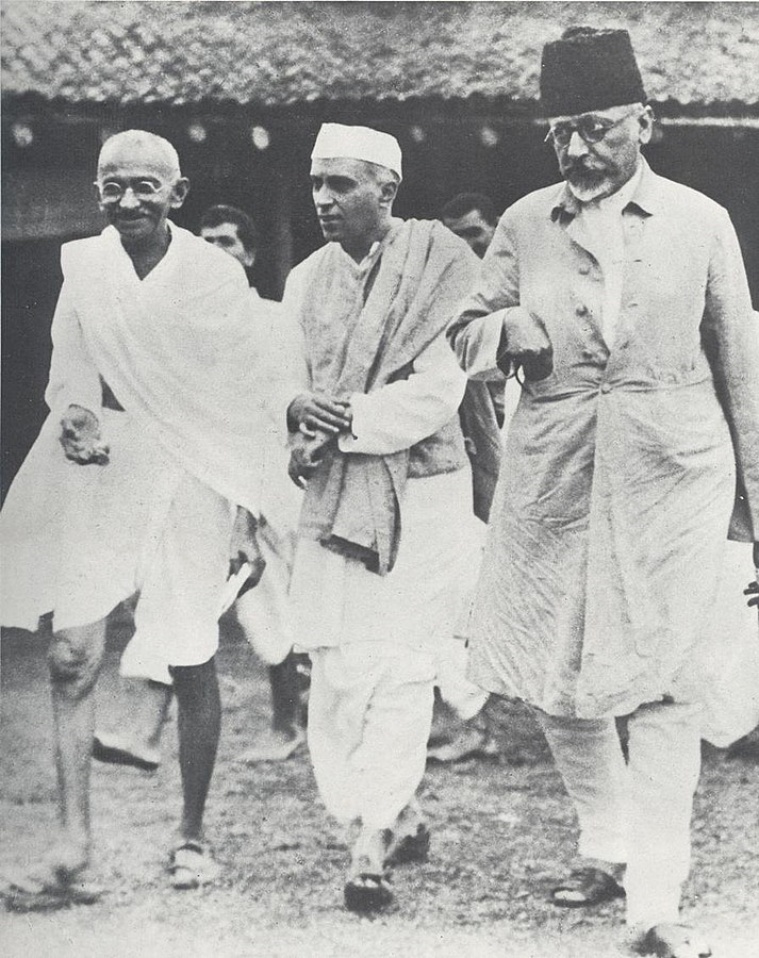 Jawaharlal Nehru with Mahatma Gandhi and Abul Kalam Azad, Wardha, August 1935. (Wikimedia Commons)
Jawaharlal Nehru with Mahatma Gandhi and Abul Kalam Azad, Wardha, August 1935. (Wikimedia Commons)
Maulana Abul Kalam Azad: Yet another staunch Gandhian in the first cabinet of independent India was the education minister, Abul Kalam Azad. He was one of the very few Muslim leaders in the close circuit of Gandhi, and often his strongest answer to critiques against him and the Congress as being a Hindu body.
Azad met Gandhi in 1920 in Delhi when the latter reached out to him for support in the Khilafat struggle. When Gandhi sketched out his combined action plan for non-cooperation and the Khilafat movement, those present at the meeting had varying responses. For Azad, there was no hesitation in his mind. “If people really wanted to help Turkey, there was no alternative to the programme sketched by Gandhiji,” wrote Azad in his book, ‘India wins freedom’ (1959).
It was during the period of the Khilafat struggle that Azad grew extremely close to Gandhi and his philosophy. With Gandhi, Azad shared a a strong passion for religion and a belief in Hindu-Muslim unity. He also became a strong opponent of the Muslim intellectuals who were critical of the Congress and Gandhi’s leadership. Even when Azad’s close friend, Chittaranjan Das, broke away from the Congress to form a separate party, he chose to remain committed to Gandhi.
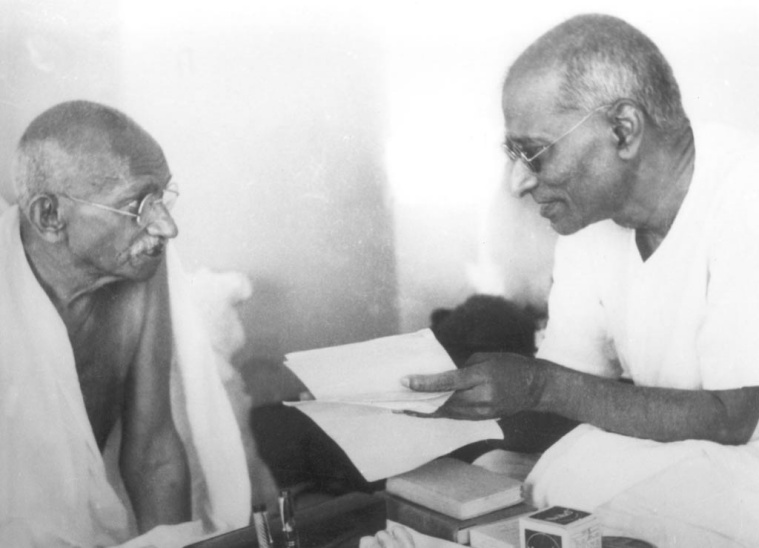 Gandhi and Rajaji (Indian Express Archives)
Gandhi and Rajaji (Indian Express Archives)
C Rajagopalachari: The last governor-general of India, C Rajagopalachari, popularly known as Rajaji shared a most intimate relationship with Gandhi and replicated many of his ideas in the South. Historian Anthony Copley has called Rajaji “Gandhi’s Southern commander”. Gandhi himself described him as “the keeper of my conscience”.
Rajaji had found adoration for Gandhi even before he met him. As a young lawyer in Salem, he had come across the works of Henry David Thoreau on civil disobedience and was rather fascinated by it. Soon after he came to know of Gandhi in South Africa putting to use the same ideology. So closely was Rajaji following Gandhi’s movement in South Africa that in 1913 he printed at his own expense, a pamphlet detailing Gandhi’s experiences in jail.
It was only in 1919 that Rajaji first met Gandhi in Madras, when the latter was planning the Rowlatt Satyagraha. Rajaji wholeheartedly joined him. He was deputed by Gandhi to lead the Salt Satyagraha in the south. Later he built an ashram in Tiruchengode in Tamil Nadu to propagate Gandhian ideas of khadi, Hindu-Muslim harmony and the abolition of untouchability.
Even though Rajaji considered himself a disciple of Gandhi, he was also vocal in his opposition to him. This he did most vehemently in 1942, when he opposed the Quit India Movement, going against almost every other leading Congress figure. He believed that dialogue with the British, rather than a fresh satyagraha, was the need of the hour. Despite his opposition, Gandhi never let the political disagreement infringe upon their personal ties. This was all the more necessary since by then they were also related: Gandhi’s son Devadas was married to Rajaji’s daughter, Lakshmi.
Rajaji’s reverence for Gandhi was most evident from the way he addressed him in his letters: “My dearest master”, “My dearest Mahatma ji”, “My dearest Bapu”. Despite being a staunch Gandhian and a Congress loyalist, Rajaji left the party in 1956 and started the Swatantra Party. This he did because he believed that the dominance of a single party was unhealthy for a democracy.
Jayaprakash Narayan: In modern political understanding, there is a common belief that the Congress inherited the legacy of Mahatma Gandhi, while the BJP took on that of Jayaprakash Narayan. What is often forgotten is the fact that the latter was in fact a disciple of Gandhi as well, and one among his 12 ‘apostles’.
JP’s initial involvement in the Gandhian movement happened through his wife, Prabhavati Devi, who on the invitation of Gandhi had become an inmate of the Sabarmati Ashram. Having heard Maulana Azad speak about the non-cooperation movement launched by Gandhi against the Rowlatt Act, moved him to the extent that left Bihar National College just 20 days before his final examinations. He then joined Bihar Vidyapeeth which was founded by Rajendra Prasad.
After completing his education from America in 1929, JP joined the Congress at the behest of Nehru and there he found a mentor in Gandhi. Even though he admired Gandhi he also disagreed with his methods. JP was a fiesty socialist and thought Gandhi’s strategies to be too timid. He did not shy away from letting him know the same either. In June 1941, he wrote a letter to Gandhi from a detention camp in Deoli where he had been arrested following an act of individual satyagraha. “One feels like weeping at the slow pace of the struggle. And you used to say that the fight will now be carried on more intensively. The state and the lack of purpose of the Congress have together made us helpless. In future we must endeavour to rid ourselves of this helplessness,” he wrote. (as cited by historian Ramachandra Guha in his book, ‘Gandhi: The years that changed the world, 1914-1948’)
There were a few others as well, who formed part of the inner circuit of Gandhi and in varying capacities served the nationalist movement and later the independent nation through Gandhian ideals. Miridula Sarabhai and Kamaladevi Chattopadhyay were two prominent feminist activists who were disciples of Gandhi. Then there was J B Kripalani, who joined the Swatantra Party and decided to uphold Gandhian philosophy in the opposition. J C Kumarappa, the pioneer of rural economic development theories in India was a staunch follower of Gandhi and used his principles in his theories. There was also Madeleine Slade, also known as Meera Behn, the British supporter of the Indian independence cause and a follower of Gandhi. She devoted her life to advancing Gandhian principles. Lastly, there was Frontier Gandhi, Khan Abdul Gaffar Khan, who following Gandhi’s principle of Hindu-Muslim unity was a vehement critique of the Partition and worked tirelessly against the dominance of the Pakistan state.
Must Read
Apr 19: Latest News
- 01
- 02
- 03
- 04
- 05






































